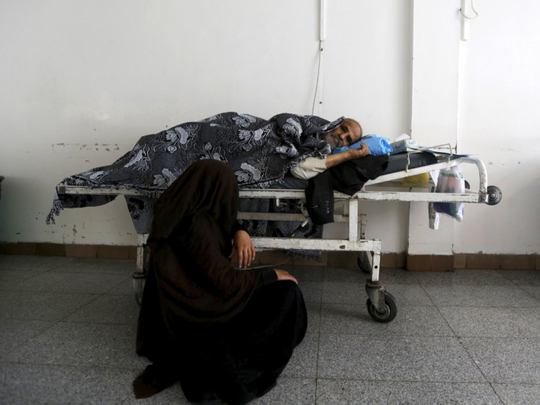
Aden: With every passing day, Abdul Rahman’s fever worsened. Emaciated, and unable to recognise his loved ones, he died from severe malaria, leaving behind his distraught wife and three young children.
His son Abdul Salam, insisted on taking his 45-year-old father to the hospital. But the father was reticent. “Let me die here in the house. If I leave, they will kill me in the streets,” he said, referring to the indiscriminate shelling by the Al Houthi militia outside his home in Crater district.
“When Al Houthis entered, we couldn’t leave our homes. The militias were hitting anyone. Even the hospital ambulances refused to come here,” Abdul Salam recalls vividly, still in shock.
After crossing 30 checkpoints manned by the militia between his house in Crater and Al Jumhoriya hospital, his father was taken in, but it was too late. When he arrived at the hospital, there was no electricity or running water.
“There were only volunteers. All the doctors left for their villages, as the militia were targeting the hospital,” said Salam.
Rahman’s story is strikingly familiar in Yemen’s southern port city of Aden. Al Houthi militia and forces loyal to former president Ali Abdullah Saleh seized Crater’s neighbourhood in April. People were trapped in their homes — the young, sick and the elderly, for fear of reprisal.
Consequently, Aden’s main hospitals and health centres closed, including the Al Jumhoriya in Khormaksar and Basahaib military hospital in Al Tawahi. Some private hospitals in Al Mansoura and Shaikh Othman districts are functional. On Wednesday, Reuters reported that a woman and her three children died due to random shelling by Al Houthi fighters in both residential districts.
Dr Sameh Al Awlaqi, a local doctor said, “22 May hospital in Mansoura district and Al Sadaka hospital in Shaikh Othman district are overflowing with patients, some are on the floor.”
With the fighting raging on, locals fear that a Medecins Sans Frontiers (Doctors without Borders) surgical centre in Shaikh Othman and ICRC in Al Mansoura district are under threat.
Dr Al Awlaqi said areas controlled by the Al Houthis, chiefly, Crater, Ma’ala, Khormaksar and Tawahi districts, have seen the highest mortality rates due to dengue fever and severe malaria.
The World Health Organisation (WHO) confirmed 3,000 cases last week, but Aden’s health office reported that 8,000 people have been diagnosed with the deadly fever, while 569 have died, since the start of the bombing campaign against the Al Houthis by the Saudi-led coalition.
Lack of clean water, uncollected waste, and a crumbling health infrastructure have added to the unsanitary conditions and rising death toll.
Other southern cities: Lahj, Hadramout, and Hodeida are not far behind. Due to poor sanitation and malnutrition for years, the second biggest port city Hodeida is witnessing a high incidence of dengue fever and malaria. The ongoing fighting has put a greater strain on the struggling health-care system.
The head of Hodeida’s health authority, Dr Abdul Rahman Jarallah, said that since the start of the fighting, he has dealt with 19,406 cases of dengue fever and 19,666 malaria cases.
One of the casualties was Yahya Sharaf’s 12-year-old son. Last week he was diagnosed with dengue fever at Hodeida’s Al Thawra Hospital. After battling weeks of high fever and poor appetite, his health failed irreversibly. In the days after being admitted to hospital, the boy showed signs of recovery, but died three days later. “I don’t know what happened, may be they gave him the wrong medicine. At home, he was responding, but here he deteriorated, “ Sharaf said.
Still trying to come to terms with the unexpected loss of his only son, Sharaf said: “I didn’t want to take him to the hospital. I thought if he goes there, he wouldn’t come out alive, and he didn’t.”
The UN envoy to Yemen has warned that the country is a step away from a famine, with more than 6.5 million people believed to be facing a food security crisis.
Dr Al Awlaqi said there is an acute shortage of medicines too. Aid shipments have been denied access frequently and very few local NGOs succeed in delivering aid across the local health centres.
Last week, the United Nations launched a renewed appeal for $1.6 billion in funds to help Yemen’s civilians.
But Salam argued that the aid is falling into the hands of the militias. “What are you talking about the UN, all the aid which is distributed is given to the militias. They are liars.”
Dr Al Awlaqi said that sick residents of Aden are now flooding Hadramout’s hospitals. “At the moment, there are no vaccinations,” he said. But he believes that the diseases can be contained to an extent with mosquito nets, safe drinking water and proper diagnostic tools.
For now, Dr Al Awlaqi says, this support is lacking. “WHO and other UN agencies have a responsibility in this regard, together with other international NGOs, local health authorities and the government.”
— Charlene Rodrigues is a freelance journalist based in Yemen












